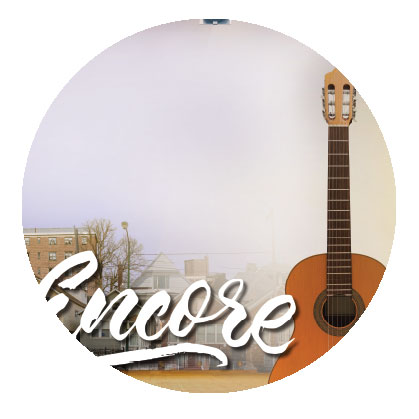Encore: Chapter 56

He was desperate to go to Lakewood, to walk in to Glantz’s and hear his own song on the speaker, to see bochurim in the streets who might have heard the song, to get feedback from the real world

Shuey Portman went home Monday night, even though he usually waited until Tuesday, telling himself that he needed to stop in at Blau’s bar mitzvah. Henny seemed delighted that he was coming home, which was nice, but also surprising; she was usually pretty good at seeing his real motivations and she was never shy about pointing them out.
At this point, three days after the song had been released, it was clear that it was a hit. The downloads had shot up, from hundreds to thousands. The Israeli websites and radio shows had gotten into it as well, and even though they all managed to mess up Shuey’s name, it was worth it, especially since one of them had done a deep dive into all of Shuey’s music, pulling up the old hits of a decade earlier. Shuey spent most of the morning in his office, shaking his head in wonder at the fact that people were pressing play and hearing his song, his voice, his composition, and his boys.
There were texts coming in: old friends, his cousin Levi, even Gershy who drove the truck for Three-Star, but the message he was waiting for hadn’t come yet. He heard that Benny Balsam had talked the song up on the radio, and he spent an hour listening to archived shows until he found the right installment. Benny Balsam was a newcomer on the scene, so it was nice to hear the popular radio host crowing about “the return of a legend…yeah, I can say legend, Portman was a big deal when we were in yeshivah… and is this the start of a comeback? You guys listen, you guys decide…heeeere we go….”
Shuey didn’t think the “when we were in yeshivah” bit was necessary, it made him sound like from another era, like a Rabbis’ Sons reunion, but whatever.
Henny had worried that Shuey’s name being out there as a singer wasn’t the greatest thing for Malka’s shidduchim, and he resisted the urge to remind her that she had made the same point about working for a yeshivah and before that, about being a snack salesman.
He was desperate to go to Lakewood, to walk in to Glantz’s and hear his own song on the speaker, to see bochurim in the streets who might have heard the song, to get feedback from the real world. Modena was great, and the boys hadn’t stopped singing the song in weeks, but he was looking for something else.
There was some paperwork to take care of, and he decided he would pull out after Minchah. The roads were dry, the sun was shining, and the idea of driving up the Thruway listening to his own song appealed to him.
He opened the computer to see another email from the Brooklyn yeshivah that wanted to rent the Modena premises over the next Shabbos off. Shuey liked the idea. It was a potential source of income, and that was certainly welcome. He needed at least $5,000 to repair the roof, and Terrence kept warning that someone would break a leg on the icy path if it wasn’t repaved properly, but Shuey knew that this question had to go to the Rosh Yeshivah, who might not agree.
There was no telling with him. Since the song’s release, Shuey had been keeping his distance from Rabbi Wasser. He’d been home for Shabbos and kept himself busy most of Sunday, calling parents and trying to get tuition payments.
He had also been gently gauging their reaction to the song. Most of them had heard about it and seemed pleased, but there were a few exceptions and one of the mothers, Tishler, had asked outright if she had sent her son to a yeshivah or a music school.
The exterminator also needed to be paid, and Shuey needed to juggle some things in order come up with the money. He opened the Chase website to figure it out, and for the second time, he froze. Money had come in again, $10,000 from the Torah Support Growth Fund.
It was nice, but also, for some reason he couldn’t explain, unnerving.
He sighed again and decided that he would leave before Minchah and daven in Lakewood.
enny called as he was merging on to 17.
“Can I tell people you’re coming to Lakewood?” she asked. “There’s some guy who keeps calling the house, I don’t recognize the number, and he wants to know how to reach you, what your new cell number is, it seems like it’s very important to him.”
“Do you have a name?” Shuey asked, as if he got endless phone calls and needed them monitored.
“He wouldn’t say his name, but I’m pretty sure I know who it is, I think it’s the Raffi guy, your old buddy.”
An oversized Wrangler honked loudly and Shuey realized he was crowding the left lane, barely even giving gas. He shifted to the right lane and considered what his wife had just said.
“Raffi,” he repeated.
Sometimes, even the scenario you’ve been daydreaming about for weeks can catch you by surprise.
hlomo Bass was aware of the surge in popularity, even if he didn’t react to it.
He had gotten used to hearing his guitar strumming and his voice doing that sophisticated low harmony, the sound blasting from speakers on the basketball court, in the dormitory, even in the showers.
He didn’t have a lot of old friends, so he hadn’t gotten much feedback from beyond yeshivah, but he knew that the song was good. He wondered if his father, traveling in England, had heard the song yet and what his reaction would be.
Pinchos Bass was adamant about tradition in yeshivos, and found the whole extracurricular thing to be American and silly, so music in a yeshivah might offend him. But he also believed strongly in the Bass family’s musical genes and took some sort of grim pride in Shlomo’s gifts.
Shlomo himself wasn’t sure what he believed. It was obvious to him that the Rosh Yeshivah didn’t share Rabbi Portman’s enthusiasm for the song, but Shlomo had also seen the way the project had invigorated the bochurim and created a new sense of achdus between them.
Just a few days in, the more “out there” bochurim, Korman and Zeldman, had updated stats on the song’s success — which radio shows had played it, how many downloads it had, which yeshivah had sung it during the Shabbos seudos and which wedding singer had used it in the second dance last night.
Eventually, Shlomo reasoned, it would reach his father, and the word Modena would catch his eye and he would listen.
“Bass, Bass!” Perensky was suddenly dancing in front of Shlomo as if he were a chassan, moving backward and waving his arms above his head.
“Forever and ever, ever and ever.” Perensky wasn’t much for carrying a tune, but he could certainly dance, and as Shlomo walked toward the beis medrash, Perensky stayed with him, dancing backward.
Near the doorway of the beis medrash, Perensky stopped, spun around and nodded toward a small group of applauding bochurim.
“No, rabboisai, I’m not the hero here, our friend Shlomo is, what a voice, what a legend…Forever and ever and ever,” he started again.
This, Shlomo Bass thought to himself, was American.
But it was also very nice.
to be continued…
(Originally featured in Mishpacha, Issue 839)
Oops! We could not locate your form.


